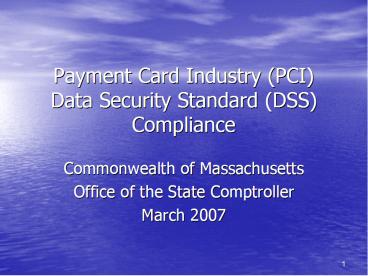Payment Card Industry PCI Data Security Standard DSS Compliance - PowerPoint PPT Presentation
1 / 11
Title:
Payment Card Industry PCI Data Security Standard DSS Compliance
Description:
If you transact credit card business, you have to worry about it. ... Credit card industry Founders of the PCI Security Standards Council are Visa, ... – PowerPoint PPT presentation
Number of Views:1007
Avg rating:3.0/5.0
Title: Payment Card Industry PCI Data Security Standard DSS Compliance
1
Payment Card Industry (PCI) Data Security
Standard (DSS) Compliance
- Commonwealth of Massachusetts
- Office of the State Comptroller
- March 2007
2
What is PCI DSS?
- Mandatory compliance program resulting from a
collaboration between the credit card
associations to create common industry security
requirements for cardholder data.
3
More about PCI compliance.
- Common set of industry tools and measurements to
ensure safe handling of sensitive information. - Actionable framework for developing a robust
account data security processincluding
preventing, detecting, and reacting to security
incidents. - Technical requirements for secure storage,
processing, and transmission of cardholder data. - Common auditing and scanning procedures.
4
Who has to worry about it?
- If you transact credit card business, you have to
worry about it. - Merchants and third party providers who process,
transmit, or store cardholder data are required
to adhere to certain data security standards. - Applies to credit card business transacted over
all payment channels (POS, mail, IVR, and
e-commerce).
5
Who are the stakeholders?
- Credit card industry Founders of the PCI
Security Standards Council are Visa, Mastercard,
Amex, Discover, and JCB brands. - Acquiring banks/member banks must require PCI
compliance from merchants and service providers
doing credit card business. - Merchants and service providers must be PCI
compliant, regardless of channel. - Our customers.
6
PCI DSSCovers 6 Areas/12 Requirements
- Build and Maintain a Secure Network
- 1. Install and maintain a firewall configuration
to protect data - 2. Do not use vendor-supplied defaults for system
passwords and other security parameters - Protect Cardholder Data
- 3. Protect stored cardholder data
- 4. Encrypt transmission of cardholder data and
sensitive information across open public networks
- Maintain a Vulnerability Management Program
- 5. Use and regularly update anti-virus software
- 6. Develop and maintain secure systems and
applications
7
PCI DSSCovers 6 Areas/12 Requirements
(continued)
- Implement Strong Access Control Measures
- 7. Restrict access to data by business
need-to-know - 8. Assign a unique ID to each person with
computer access - 9. Restrict physical access to cardholder data
- Regularly Monitor and Test Networks
- 10. Track and monitor all access to network
resources and cardholder data - 11. Regularly test security systems and processes
- Maintain an Information Security Policy
- 12. Maintain a policy that addresses information
security
8
Major Activity Areas
- Identify merchant level (dependent on volume).
- Subject matter expertise.
- Consulting and recommendations.
- Compliance relates to infrastructure security
and business procedures (may be supported by
Qualified Security Assessor (QSA)). - Annual self-assessment questionnaire
- Annual on-site security audit (depending on
merchant level) - Validation process performed by an Approved
Scanning Vendor (ASV) on all external-facing IP
addresses. - Possibly, audit (depending on merchant level).
9
Our Approach
- See what departments and other states are doing.
- Communicate share information to promote
awareness of the issue, identify participating
departments, and gain support. - Learn about PCI DSS Compliance.
- Check in with banks and service providers on
their PCI Compliance status and requirements. - Initiate a procurement to identify Qualified
Security Assessors (QSVs) and Approved Scanning
Vendors (ASVs) to assist departments in achieving
compliance and validation. - Identify costs and funding.
10
Consequences of Non-Compliance
- Forensic investigation
- Steep monetary fines (up to 500K) levied by the
card associations - Lawsuits
- Damage to reputation
- Bad publicity
- Revocation of credit card business privileges
11
For more information
- See https//www.pcisecuritystandards.org/index.htm
and http//www.pcicomplianceguide.org for
general information. - Check out the self-assessment questionnaire at
https//www.pcisecuritystandards.org/pdfs/pci_saq_
v1-0.pdf to assess level of effort and resources
to remediate problems and achieve compliance. - See http//usa.visa.com and Visa Cardholder
Information Program (CISP) links. - See http//www.mastercard.com/us/sdp/assets/pdf/SD
P_Presentation.pdf for Mastercard Site Data
Protection (SDP) information - Stay tuned for updates on RFR progress.































